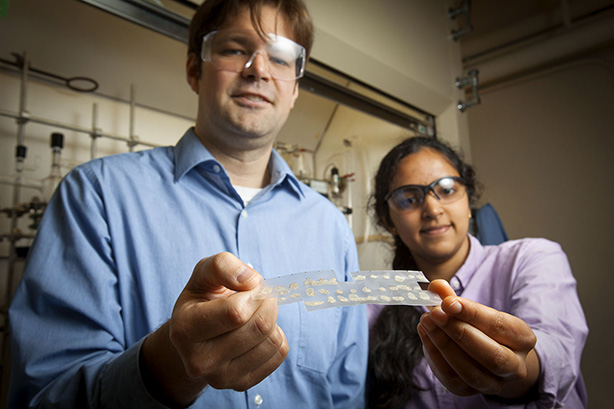RESEARCH SPOTLIGHT

Will Dichtel, assistant professor of chemistry, and graduate student Deepti Gopalakrishnan hold samples of their polymer that uses fluorescence to detect the explosive RDX.
Chemistry finds formula for success
Baker Lab is still abuzz as faculty from Cornell's Department of Chemistry and Chemical Biology celebrate the bevy of awards they brought home last fall from the American Chemical Society. Excitement was particularly high because the awards were for new, young faculty members as well as established faculty.
"We rely on our young faculty members to help us see over the horizon to what the next big areas of research will be," says Dave Collum '77, department chair, who joined the department in 1980 as an assistant professor when he was 25. "We invest in those ideas."
Honored in November by the American Chemical Society were:
Jack H. Freed, the Frank and Robert Laughlin Professor of Physical Chemistry, who won the Joel Henry Hildebrand Award in the Theoretical and Experimental Chemistry of Liquids;
Melissa A. Hines, professor and director of the Cornell Center for Materials Research, honored with the W. Adamson Award for Distinguished Service in the Advancement of Surface Chemistry;
Jerrold Meinwald, professor emeritus, who won the Nakanishi Prize for the study of biological phenomena;
William Dichtel, assistant professor, who received the National Fresenius Award for outstanding chemists early in their professional careers;
Hening Lin, associate professor, winner of the Eli Lilly Award in Biological Chemistry; and
Peng Chen, the Peter J.W. Debye Professor of Chemistry and Chemical Biology, who received the Coblentz Award for development and application of single-molecule fluorescence microscopy to study catalysis on individual nanoparticles.
Collum credits the department's hiring process, emphasis on teaching, support of faculty and recent physical space improvements as factors in the department's success. He says the department seeks out people who can bridge several fields.
"My research has benefited from several strong collaborations, both within my home department and across the campus, and my colleagues are extremely supportive of young faculty members," Dichtel says.
Chemistry faculty are enjoying their lab space in Cornell's new Physical Sciences Building, and the College of Arts and Sciences has renovated a number of older offices in Baker Lab for new faulty members.
The beneficiaries of these accolades and improvements are students. "Undergrads are being taught by people who are at the top of their fields," Collum says. "And there is tremendous peer pressure to teach well."
The department's teaching evaluation group visits classrooms each semester, offering advice to faculty members or recommending training. And the department is revamping its curriculum to allow undergraduates to design a major from a large number of options.
"The award is important to me because it shows that my peers appreciate and value sustained contributions to fundamental questions in chemistry," Hines says.
Dichtel credits his team of undergraduates, graduate students and postdoctoral researchers. "Witnessing them mastering their chosen fields, both in the classroom and the laboratory, is the best part of my job," he says.
And for graduate student David Bunck, the chance to investigate a new class of plastics in Dichtel's lab was a key motivator for choosing Cornell.
"Cornell has an excellent reputation for being one of the best chemistry departments in the country," Bunck said. "[In the lab, our] projects can take – and have taken – unexpected turns that counter our basic understanding of these materials … this balance of fundamental science with real-world applications is, in my opinion, the most exciting sort of research to be involved with."
Kathy Hovis is a writer for the College of Arts and Sciences.